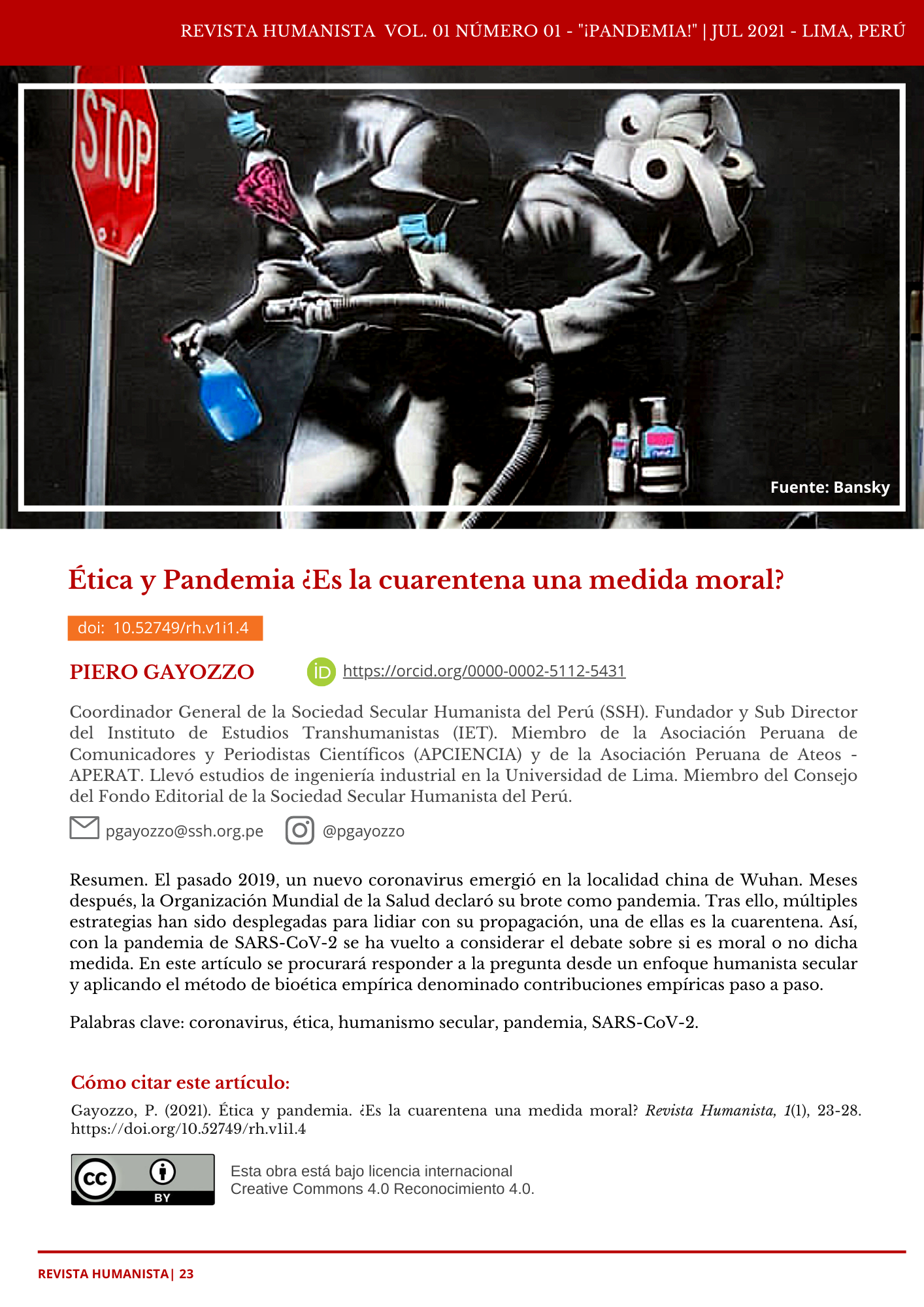Ética y Pandemia ¿Es la cuarentena una medida moral?
DOI:
https://doi.org/10.52749/rh.v1i1.4Palabras clave:
coronavirus, ética, humanismo secular, pandemia, SARS-CoV-2Resumen
El pasado 2019, un nuevo coronavirus emergió en la localidad china de Wuhan. Meses después, la Organización Mundial de la Salud declaró su brote como pandemia. Tras ello, múltiples estrategias han sido desplegadas para lidiar con su propagación, una de ellas es la cuarentena. Así, con la pandemia de SARS-CoV-2 se ha vuelto a considerar el debate sobre si es moral o no dicha medida. En este artículo se procurará responder a la pregunta desde un enfoque humanista secular y aplicando el método de bioética empírica denominado contribuciones empíricas paso a paso.
Descargas
Citas
Alfaro, J., Castellá Sarriera, J., Casas, F., Valdenegro, B., & Oyarzún, D. (2014). Adaptación del Índice de Bienestar Personal para adolescentes en lengua española y portuguesa. Universitars Psychologica.
Borry, P., Schotsmans, P., & Dierickx, K. (2004). What is the role of empirical research in bioethical reflection and decision-making? An ethical analysis. Medicine Health Care and Philosophy, 41-53.
Brooks, S. K., Webster, R. K., Smith, L. E., Woodland, L., Wessely, S., Greenberg, N., & Rubin, G. J. (2020). The psychological impact of quarantine and how to reduce it: rapid review of the evidence. The Lancet, 1-9. doi:doi:10.1016/S0140-6736(20)30460-8
Bunge, M. (1989). Treatise on Basic Philosophy. Volume VIII. Ethics: the good and the right. Kluwer Academic Publishers.
CDC. (29 de Septiembre de 2017). Quarantine and Isolation. Obtenido de Centers for Disease Control and Preevention: https://www.cdc.gov/quarantine/index.html
Ceylan, R. F., & Ozkan, B. (2020). The economic effects of epidemics: from SARS and MERS to COVID-19. Research Journal in Advanced Humanities, 1(2), 21-29. https://royalliteglobal.com/advanced-humanities/article/view/132
Cribb, A., & Owens, J. (2017). Embracing Diversity in Empirical Bioethics. En J. Ives, M. Dunn, & A. Cribb, Empirical Bioethics. Theoretical and Practical Perspectives (pp. 103-122). Cambridge University Press.
Cummins, R. A., Eckersley, R., Pallant, J., Van Vugt, J., & Misajon, R. (2003). Developing a national index of subjective wellbeing: The Australian Unity Wellbeing Index. Social Indicators Research, 159-190.
Davies, R., Ives, J., & Dunn, M. (2015). A systematic review of empirical bioethics methodologies. BMC Medical Ethics, https://doi.org/10.1186/s12910-015-0010-3.
Day, T., Park, A., Madras, N., Gumel, A., & Wu, J. (2006). When Is Quarantine a Useful Control Strategy for Emerging Infectious Diseases? American Journal of Epidemiology, 163(5), 479-485. doi:doi:10.1093/aje/kwj056
Gayozzo, P. (2020). Pandemia: Coronavirus y virus mentales. Neo-Skepsis, 7.
Harris, S. (2010). The Moral Landscape: How Science Can Determine Human Values . Free Press.
Harris, S. (2012). Free Will. Free Press.
Hawryluck, L., Gold, W. L., Robinson, S., Pogorski, S., Galea, S., & Styra, R. (2004). SARS Control and Psychological Effects of Quarantine, Toronto, Canada. Emerging Infectious Diseases, 1206-1212. doi:10.3201/eid1007.030703
Jeong, H., Woo Yim, H., Song, Y.-J., Ki, M., Min, J.-A., Cho, J., & Chae, J.-H. (2016). Mental health status of the quarantined people due to Middle East Respiratory Syndrome (MERS). Epidemiology and Health, 38. doi:10.4178/epih.e2016048
Johns Hopkins University. (28 de Enero de 2021). COVID-19 Dashboard by the Center for Systems Science and Engineering (CSSE) at Johns Hopkins University (JHU). Coronavirus Research Center: https://coronavirus.jhu.edu/map.html
Kearney, M. D., Chiang, S. C., & Massey, P. C. (2020). The Twitter origins and evolution of the COVID-19 "plandemic" conspiracy theory. Harvard Kennedy School (HKS) Misinformation Review. doi:doi.org/10.37016/mr-2020-42
Keys, A. (1944). Effects of Starvation. Minnesota: University of Minnesota Starvation Study. http://www.rhondahelp.com/sites/default/files/Effects%20of%20Starvation%20%E2%80%93%20University%20of%20Minnesota%20Starvation%20Study_1.pdf
Kottusch, P., Tillmann, M., & Püschel, K. (2009). Survival time without food and drink. Archiv für Kriminologie, 224, 184-191.
Kurtz, P. (2007). What is the Relationship among Science, Reason and Ethics? En P. Kurtz, & D. Koepsell, Science and Ethics. Can Science Help Us Make Wise Moral Judgments? (pp. 11-26). Prometheus Books.
Lee, A., & Cho, J. (2016). The impact of epidemics on labor market: identifying victims of the Middle East Respiratory Syndrome in the Korean labor market. International Journal for Equity in Health, 15(1), 196. doi:doi.org/10.1186/s12939-016-0483-9
Lieberson, A. D. (08 de Noviembre de 2004). How Long Can a Person Survive without Food? Obtenido de Scientific American: https://www.scientificamerican.com/article/how-long-can-a-person-survive-without-food/
Milei, J. (2020). Pandemia y Socialismo: La cuarentena como delito de lesa humanidad [Video] YouTube. https://www.youtube.com/watch?v=hF05suI5NAs&t=3s&ab_channel=Fundaci%C3%B3nLibertadyProgreso
Pinker, S. (2008). The Fear of Determinism. En J. Baer, J. C. Kaufman, & R. F. Baumeister (Eds.), Are We Free? Psychology and Free Will (pp. 311-324). Oxford University Press.
Purdy, L. (2007). The Science of Ethics. En P. Kurtz, & D. Koepsell (Eds.), Science and Ethics. Can Science Help Us Make Wise Moral Judgments? (pp. 266-273). Prometheus Book.
Saunders, J. &. (2010). Malnutrition: causes and consequences. Clinical medicine, 10(6), 624-627. doi:doi.org/10.7861/clinmedicine.10-6-624
Savulescu, J. (2002). Abortion, embryo destruction and the future of value argument. Journal of Medical Ethics, 133-135. doi:doi:10.1136/jme.28.3.133
Upshur, R. (2003). The Ethics of Quarantine. Virtual Mentor, 5(11), 393-395. doi:10.1001/virtualmentor.2003.5.11.msoc1-0311.
WHO. (2020). Timeline: WHO's COVID-19 response. World Health Organization: https://www.who.int/emergencies/diseases/novel-coronavirus-2019/interactive-timeline?gclid=Cj0KCQjw5eX7BRDQARIsAMhYLP9Px4FTTWXYgdQ2Io6CpkAkjSNw7FdPTQWPpkxrz4nA0zR4dUjow98aAg1cEALw_wcB#!
WHO. (11 de Marzo de 2020). WHO Director-General's opening remarks at the media briefing on COVID-19 - 11 March 2020. WHO: https://www.who.int/dg/speeches/detail/who-director-general-s-opening-remarks-at-the-media-briefing-on-covid-19---11-march-2020
Wu, A., Peng, Y., Huang, B., Tan, W., Cheng, G., & Jiang, T. (2020). Genome composition and divergence of the Novel Coronavirus (2019-nCoV) Originating in China. Cell Host & Microbe, P325-328.

Descargas
Publicado
Cómo citar
Número
Sección
Licencia
Derechos de autor 2021 Piero Gayozzo

Esta obra está bajo una licencia internacional Creative Commons Atribución 4.0.
El autor de cada artículo o contribución académica publicada en la Revista Humanista se compromete a otorgar derechos de uso a otros gracias al registro en Creative Commons BY 4.0 que la Editorial ha tramitado para su obra. Esto permite el acceso gratuito e inmediato a la obra y permite a cualquier usuario leer, descargar, copiar, distribuir, imprimir, buscar o vincular acceder a los textos completos de los artículos, rastrearlos para indexarlos, pasarlos como datos al software o utilizarlos para cualquier otro propósito legal. Cada autor mantiene los derechos de su obra. La Revista Humanista posee los derechos de publicación de cada artículo. La revista no se responsabiliza por los comentarios vertidos por cada autor.



